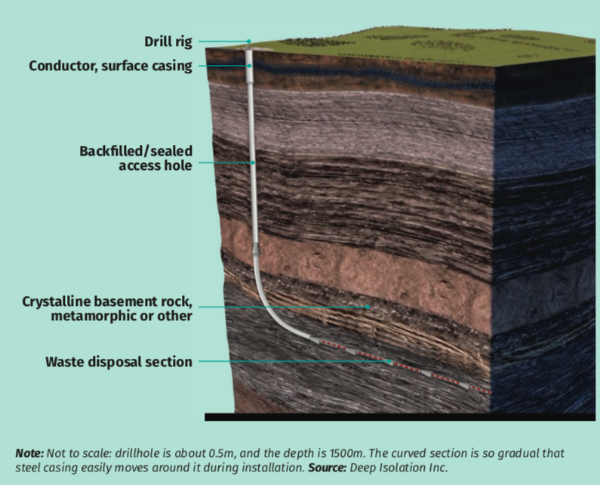A preliminary study commissioned by Fermi Energia for a potential small reactor nuclear power plant waste disposal site assessed the potential suitability of different areas in Estonia for a deep well repository. The study's preliminary assessment is that several areas could potentially be approved by the International Atomic Energy Agency (IAEA) in the future, if the need for a repository arises and if more accurate measurements also confirm this. The study was carried out by Deep Isolation, a US company that develops nuclear waste disposal technology using horizontal boreholes.
The qualitative geological assessment of the Estonian crystalline basement included a camera survey based on available geological data and analogues and did not identify any exclusions for further detailed investigations. The study assessed geological conditions as well as potential risk factors in different locations in Estonia. Fermi Energia is the first European company to have signed a contract with Deep Isolation for this type of geological exploration. The Estonian partner for the study was OÜ Inseneribüroo STEIGER.
Estonia is committed to reducing carbon dioxide emissions by 701 Ttpa3T by 2050 and to phase out oil shale electricity by 2035. By. The production of emission-free nuclear power from small modular reactors is one possible way to meet these targets, but a key issue in the debate on the deployment of nuclear power is how to safely store spent fuel for many generations.
"If we want to be successful in our endeavour and be the first European Union country to deploy one of the world's small modular reactors in the 2030s, we must take responsibility for the final storage of spent fuel at the same time as the start of electricity generation," said Kalev Kallemets, Member of the Board of Fermi Energia. "Deep Isolation's study shows that a deep hole storage solution may be the most suitable for Estonia - safe, cost-effective, deployable with low environmental impact and adaptable to volume."
As Estonia considers the use of a new generation of small modular reactors to decarbonise future energy, both policy makers and the people of Estonia need reassurance that there is a safe and affordable way to dispose of spent fuel," said Chris Parker, Head of Deep Isolation's Europe and Middle East branch. "This is an important step in confirming that almost all areas of Estonia, particularly in northern Estonia, are geologically suitable for deep geological disposal."
While in Finland, Sweden and France, for example, nuclear waste repositories are built by mining, deep well disposal would isolate spent fuel from the environment much deeper - to a depth of 1,500 metres instead of around 500 metres - but at around four times less cost. Such a price level was indicated by a recent study carried out jointly by Deep Isolation and the Electric Power Research Institute in the US. Deep wells are also significantly faster to drill - taking a few weeks to drill, while large reservoirs can take decades to extract.
Video in English introducing Deep Isolation technology:
https://www.youtube.com/watch?v=IQx5zFUUln0&authuser=1
The results of the study will be presented by Deep Isolation at a conference on 9 February at www.fermi.ee/konverents and Fermi Energy will publish a report.

